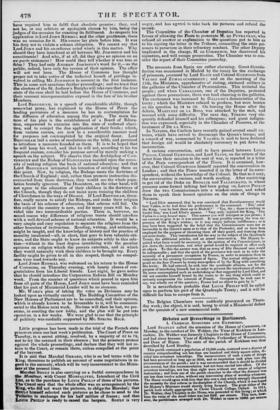The accounts from Spain are rather alarming. Great dissatis- faction
was occasioned in Madrid by the treaty for the exchange of prisoners, procured by Lord ELIOT and Colonel GURWOOD from VALDEZ and ZUMALACARREGUY ; and on the morning of the I lth, the Ministers, apprehensive of rioting, stationed soldiers in the galleries of the Chamber of Procuradores. This irritated the people ; and when CABALLERO, one of the Deputies, protested against these precautions, there was loud cheering in the galleries. The excitement was increased by GALIANO'S denunciation of the treaty ; which the Ministers refused to produce, but were beaten on the question by 54 to 50. On leaving the House after the debate, MARTINEZ DE LA ROSA was attacked by the mob, and rescued with some difficulty. The next day, TORENO very elo- quently defended himself and his colleagues; and great indigna- tion was expressed, especially in the Chamber of Proceres, at the treatment of DE LA ROSA.
In Navarre, the Carlists have recently gained several small vic- tories, which have served to discourage the Queen's troops; and a council of war, summoned by VALDEZ, is said to have declared that foreign aid would be absolutely necessary to put down the insurrection.
A curious conversation, said to have passed between Louis PHILIP, Colonel GURWOOD, and Lord ELIOT, on the return of the latter from their mission to the seat of war, is reported in a letter of the Paris correspondent of the Times. It is surmised, how- ever, that Colonel GURWOOD himself reported the conversation in London ; and that the Tunes inserted it in the letter of its corre- spondent, without the knowledge of the Colonel. Be that as it may, the conversation is curious, and worth reading. After contriving to get rid of the Duke DE BROGLIE and TALLEYRAND, in whose presence some formal talking had been going on, Louis PHILIP drew the two Commissioners into a window-corner, and asked them to speak their honest opinions on the state of things in Navarre.
" Lord Eliot answered, that he was convinced that Zumalacarreguy would
beat Valdez, 39 he had done his predecessors in the command. But,' asked the King, 'can lie beat them up to Madrid?' ' Yes, Sir ; there is nothing to hinder him,' was Lord Eliot's answer. Very well,' rejoined the King, Don Carlos is a very honest man.' This answer you will interpret as you please; I am content to give it as it was uttered. It may possibly convey the true ex- pression of the King's wishes; or it may simply indicate indifference; or it may have been suggested by the belief that the Commissioners were not so favourable to the Queen's cause as to that of the Pretender, and so have been employed for the purpose of throwing them off their guard, and drawing them out more freely. This introduction led the way to the subject of the Quadruple Treaty, the additional articles, and an armed interventirn. His Majesty in.. quired 'what force would be necessary, in the opinion of the Commissioners, to put down the insurrection, and what period would be required to effect such an object. To this the answer was, that an army of fifty thousand men would be indispensable ; and that the spirit of the provinces was such as to infer the necessity of a permanent occupation by France, in order to maintain them in subjection to the existing Government of Spain. The mutual obligations im- posed on the four Powers by treaty were spoken of by the King with something like levity. He had entered, he said, into the quadruple alliance, not for the purpose of interfering himself, but in order to prevent the interference of others. He never contemplated such an undertaking as that suggested by Lord Eliot, and did not consider himself bound by the treaty to do any thing which could so seriously compromise the interests of France. Occupation, he took care to say, was wholly out of the question; France bad no object to gain by it." It is nevertheless probable that Louis PHILIP will be called upon to perform his part of the Quadruple Treaty; and it will be difficult for him to escape from it.


























 Previous page
Previous page